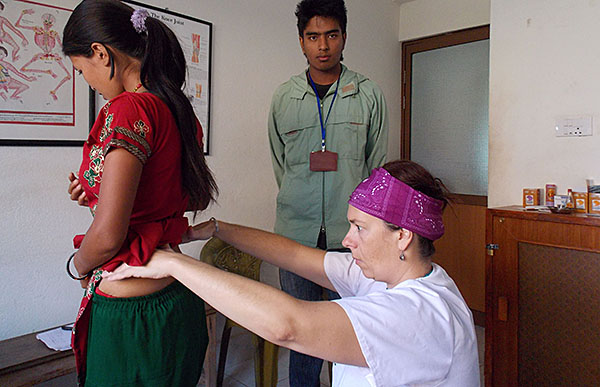
Since I’ve been here, besides treating patients, I’ve been reading some books of Buddhist thought. One book that speaks to me deeply is called Medicine & Compassion, A Tibetan Lama’s Guidance For Caregivers written by the Venerable Chokyi Nyima Rinpoche and David R. Shlim, M.D.
One thing from the book that sticks with me is the idea of treating patients with joyous diligence. The thought is that you gain energy because you enjoy the work. It is also one of the 6 virtues of a Bodhisattva, having perseverance.
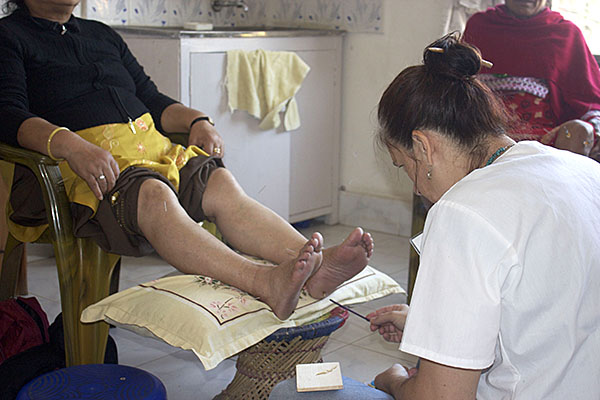
As I’ve been treating patients I’ve noticed some are easier for me to treat than others. There are many reasons for this. Some of their cases are very complex and my experience and confidence are lacking, the language barriers and the subtle things that get lost in translation are numerous, and sometimes just the pure energetics between people can be a challenge. When I run into these walls, I try to bring myself back to the idea of joyous diligence and the action of having perseverance.
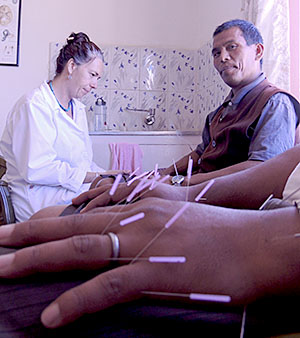 The other day I saw a woman for her second treatment and as I looked at her chart it was very complex and I thought, “What am I possibly going to be able to do to help her?” The beloved interpreter and I started in, and the patient revealed that she had been bitten by a dog. I looked away from her chart and up at her and realized that I had dodged a bullet trying to figure out how to treat the things on her chart, but that we were going to head in a totally different direction with her whole new barrage of ammo. After a few basic questions about the incident we got to the place of making choices about her treatment. Number one…if the dog was vaccinated we don’t need to send you to the health post but we do need to contact the owners and get the vaccination report to be sure. Number two…you need to go to the health post for vaccination because we can’t get a vaccination report and the dog owner doesn’t care that his dog bit you. Number three…don’t ask for a vaccination report for the dog or go to the health post and risk getting very sick.
The other day I saw a woman for her second treatment and as I looked at her chart it was very complex and I thought, “What am I possibly going to be able to do to help her?” The beloved interpreter and I started in, and the patient revealed that she had been bitten by a dog. I looked away from her chart and up at her and realized that I had dodged a bullet trying to figure out how to treat the things on her chart, but that we were going to head in a totally different direction with her whole new barrage of ammo. After a few basic questions about the incident we got to the place of making choices about her treatment. Number one…if the dog was vaccinated we don’t need to send you to the health post but we do need to contact the owners and get the vaccination report to be sure. Number two…you need to go to the health post for vaccination because we can’t get a vaccination report and the dog owner doesn’t care that his dog bit you. Number three…don’t ask for a vaccination report for the dog or go to the health post and risk getting very sick.
After tears, worry, and deep concern from all parties involved, I cleaned the wound and told her that I cared for her and I didn’t want her to get sick. She said she had no money and I assured her that was nothing to worry about and that we would take care of it as long as she agreed to go to the health post for a rabies vaccination. More tears, no way of paying us back, her husband had passed away a year ago, no money. I again assured her that the only choice she had was to go to the health post because if she got sick, it would only make matters worse. She cried and said, “Those dog owners don’t care if I die because I am poor.” We reminded her again that we cared and that was why she needed to go to the health post.
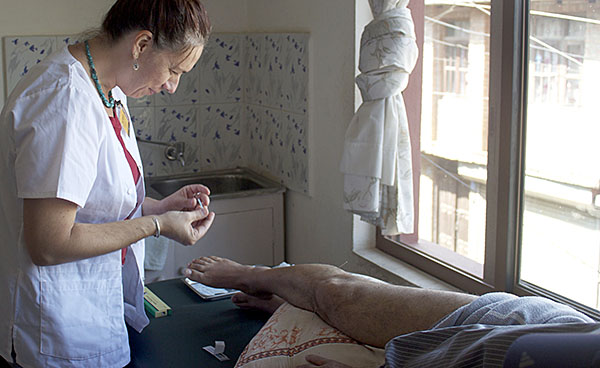
I was just about to say, “Ok, these are your options and if you don’t want to go you don’t have too.” And she said, “Ok, I’ll go. You have convinced me that I don’t want to be sick.”
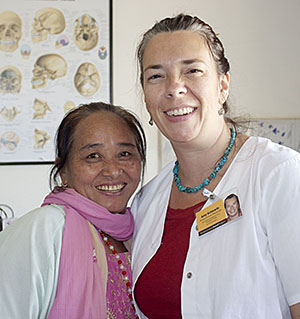 So away we went with her to receive her first of three injections. After it was all over we got back to our clinic and I treated her to ease her emotions.
So away we went with her to receive her first of three injections. After it was all over we got back to our clinic and I treated her to ease her emotions.
At the end of our treatment she thanked us for not letting her get sick and die, and told us that now we too had become her family because we cared for her.
Upon reflection of the situation, I realized that when I let go of my agenda for her care, she also let go and agreed to let us help her. I have also been struck by the fact that we fly half way around the globe to care for people, but how do we treat our neighbors and people of our own village? With joyous diligence?
---Amy Schwartz











